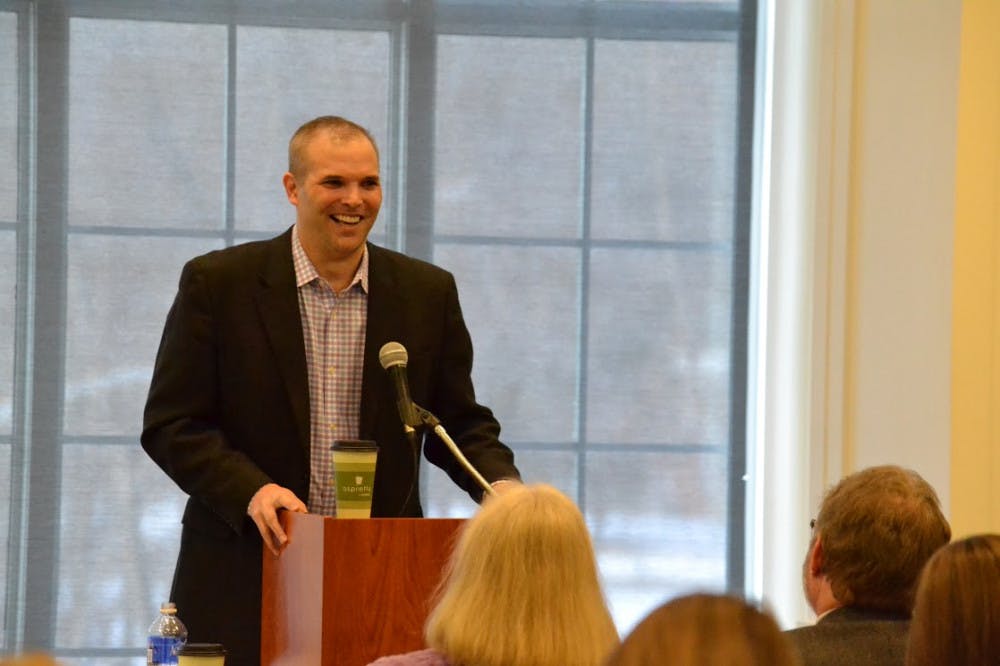By Gabrielle Beacken
News Assistant
Hollywood gets it wrong, according to political, financial and media author and journalist Matt Taibbi. Hotshot Wall Street and bank executives are not the romanticized versions often seen in films, such as the portrayal of former stockbroker-scammer Jordan Belfort in the 2013 film “The Wolf of Wall Street.”
Hollywood’s take on the economic injustice of white-collar crime is upsetting while also inaccurate, Taibbi said.

Taibbi said that instead of viewing financial injustices as solely a fiscal issue, it should be viewed as organized crime.
“It’s not an economic story,” Taibbi said. “It’s a crime story.”
Journalist for The Nation, Playboy and Rolling Stone and author of “The Divide: American Injustice in the Age of the Wealth Gap,” Taibbi lectured students, faculty, staff and the College community on Wednesday, Feb. 18, in Kendall Hall, about the economic disparity between the wealthy and poor and the lack of stipulation narrowed at white-collar criminals. This lecture was part of the semester-long Exploring Economic Justice series, sponsored by the College’s Committee on Intellectual and Cultural Programming.
Taibbi also spoke to the Humanities and Social Sciences (HSS 487) research seminar “Justice,” which includes both faculty and students.
“He talked to us for over an hour, and we got to ask questions and have an interesting colloquy,” said Morton Winston, professor of the research seminar. “It was really a nice experience for everybody.”
The first few weeks of the class were devoted to reading and analyzing Taibbi’s book, Winston said. “We wanted to explore what the ramifications of this inequality of wealth and income are for other aspects of American life. How does inequality of economics affect education, educational opportunities? How’s this inequality affect race relations?”
Taibbi admits that he didn’t begin his journey into the world of economics with a solid background.
“It was a topic I came upon completely by accident,” Taibbi said. “I couldn’t even balance my checkbook … I knew nothing about the financial justice system.”
As a political humorist following the presidential campaign trail, Taibbi realized that, including himself, “nobody had any clue what was happening on Wall Street.” Even writers reporting on the 2008 financial crisis were unfamiliar with the economics.
“I thought we crossed a line at that moment,” Taibbi said. “The ignorance of the press corps became a serious problem.”
Transitioning into producing pieces with “boring” semantics, Taibbi had to “learn an entire new language and translate it into what people understand.”
Since economics, and publications covering financial issues, are laced with sophisticated terms and complicated math references, it is difficult for the average American to understand the world of finance.
“As both a student and a journalist, I think that it is extremely important to have some basic knowledge about the financial state of our country,” junior journalism and professional writing major Shayna Innocenti said. “I think that journalists like Taibbi are doing a great job translating the complex governmental and economic jargon, so that the everyday person can understand what is transpiring around them.”
The “punchline” of the white-collar crime tale seemed to be that no one ever went to jail, was indicted or even had to pay out of their own pocket, Taibbi said.
Besides two people from Bear Stearns Co., an investment services firm, being brought to trial, “not a single individual had been indicted for misdeeds in the financial crisis,” Taibbi said.
“In 2008, indicting CEO’s may have had a catastrophic effect,” Taibbi said. However, “I never bought the excuse that not arresting people was out of concern for the economy.”
Winston agreed with Taibbi that the absence of arrests during the financial crisis was suspicious.
“It’s kind of a scandal that the criminal justice system has been so skewed by wealth,” Winston said. “It’s an important thing to know for contemporary American society … it’s an eye-opening thing for students to learn about.”
According to Taibbi, there seems to be two tiers of the criminal justice system — street crime and white-collar crime, which to many is not considered a “crime-crime.”
Due to lobbyists creating loopholes for big business, divergent allocation of resources in the police force, and prosecutors considering violators of white collar crime more like respected and intelligent peers, rather than offenders, there are weak repercussions for white-collar criminals, according to Taibbi.
“Where’s the deterrent to not commit other crimes?” Taibbi said. “Why not? Caught for one thing and essentially there was no price.”
For white-collar criminals, no incentive or deterrent to not commit crime has led to a “flowering” of white-collar offenses, Taibbi said.
Taibbi contrasted the event surrounding police brutality victim Eric Garner and the American International Group (AIG) fraud scandal and eventual government bailout.
The video of Garner’s death depicts 10 police officers eventually at the scene. On the contrary, during AIG’s scandal, one regulator at SNL Finance, a financial information firm, policed over 100,000 employees, according to Taibbi.
These two scenarios “symbolizes the difference in resources,” Taibbi said.
“One of our ideals as Americans is that there should be equal justice under the law,” Winston said. “But what (Taibbi’s) investigative reporting shows is that’s not true for many people.”
“They are two different worlds, but it is all crime,” Taibbi said. “It’s something we should all be concerned about.”







